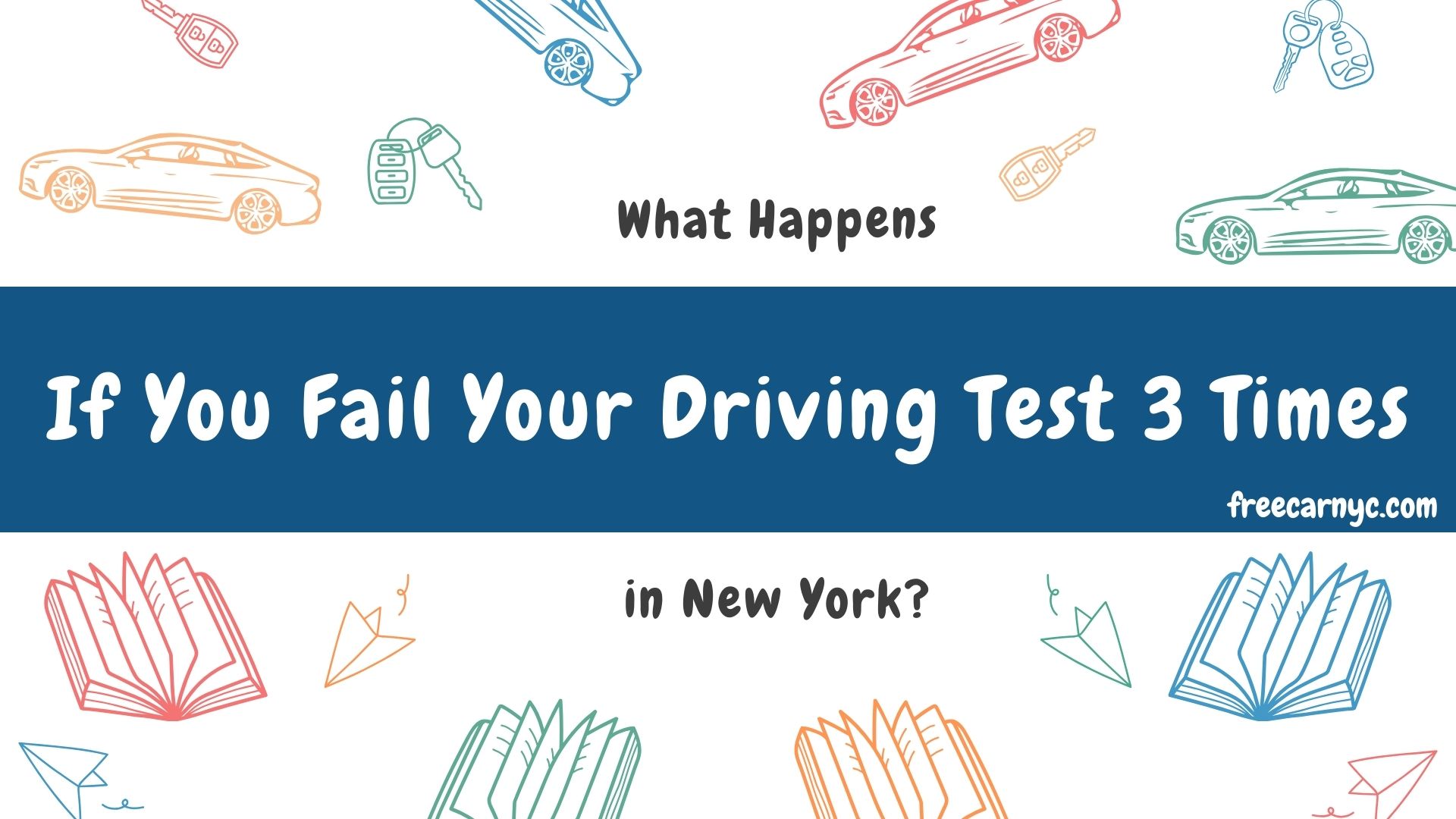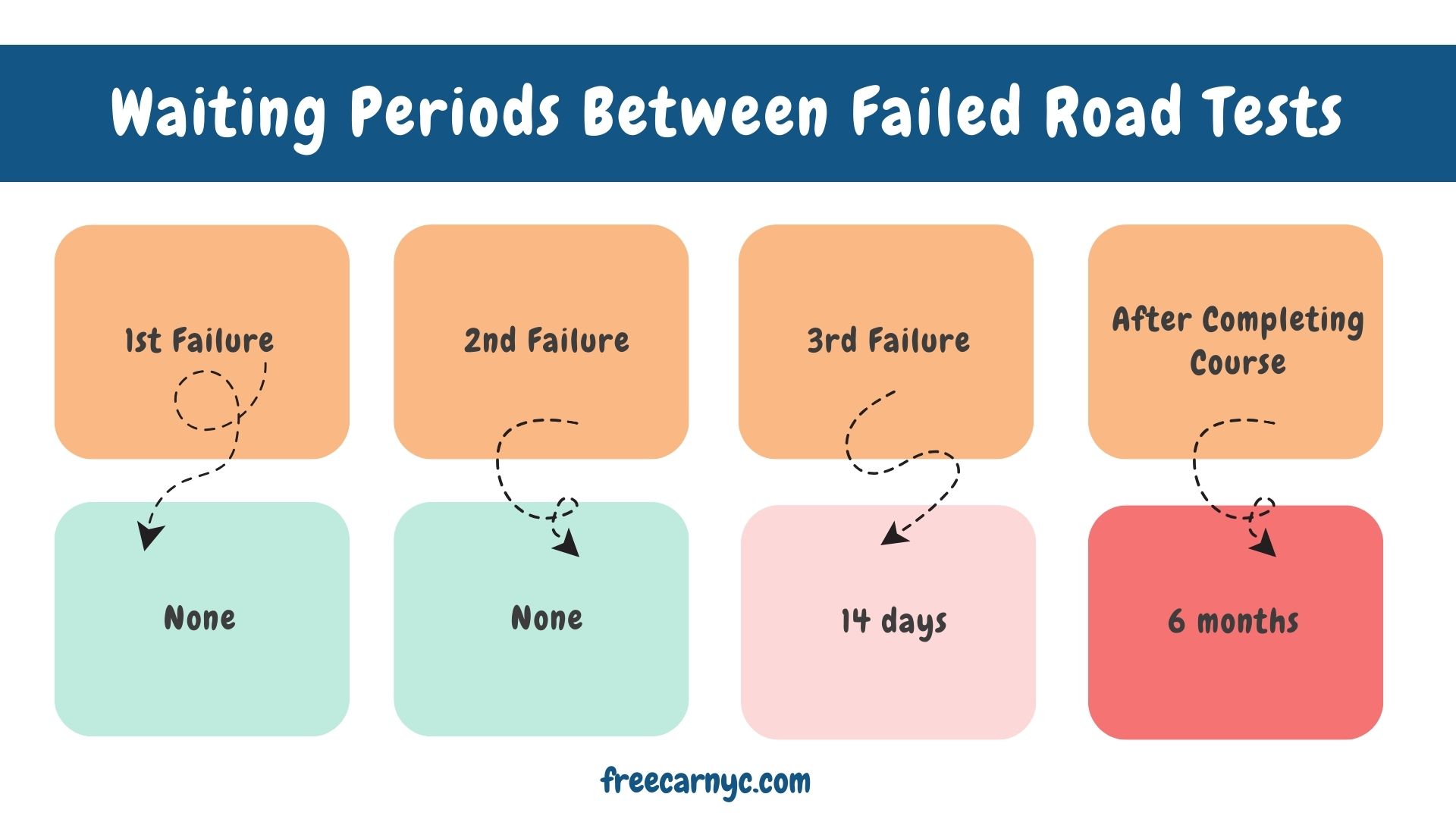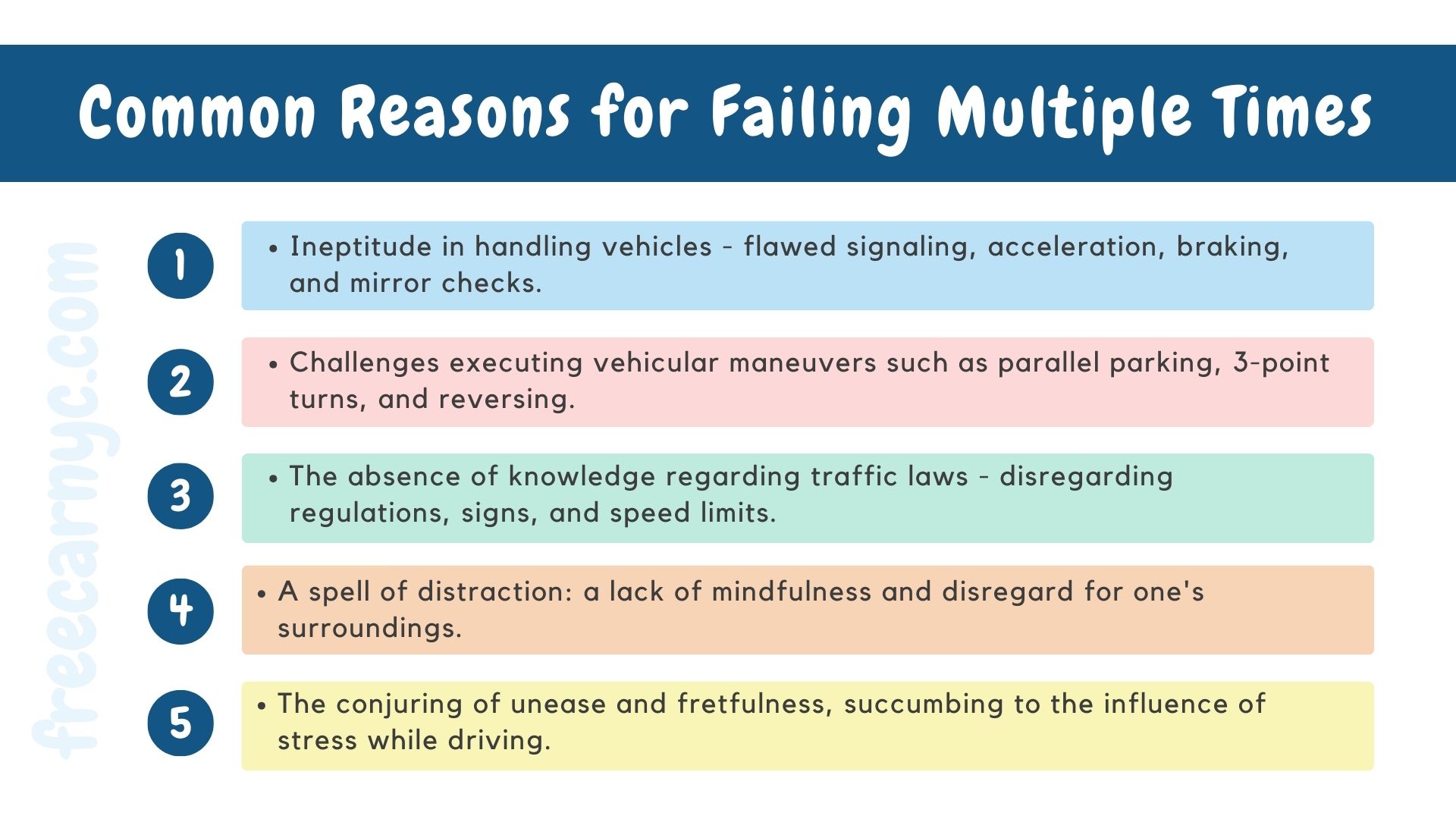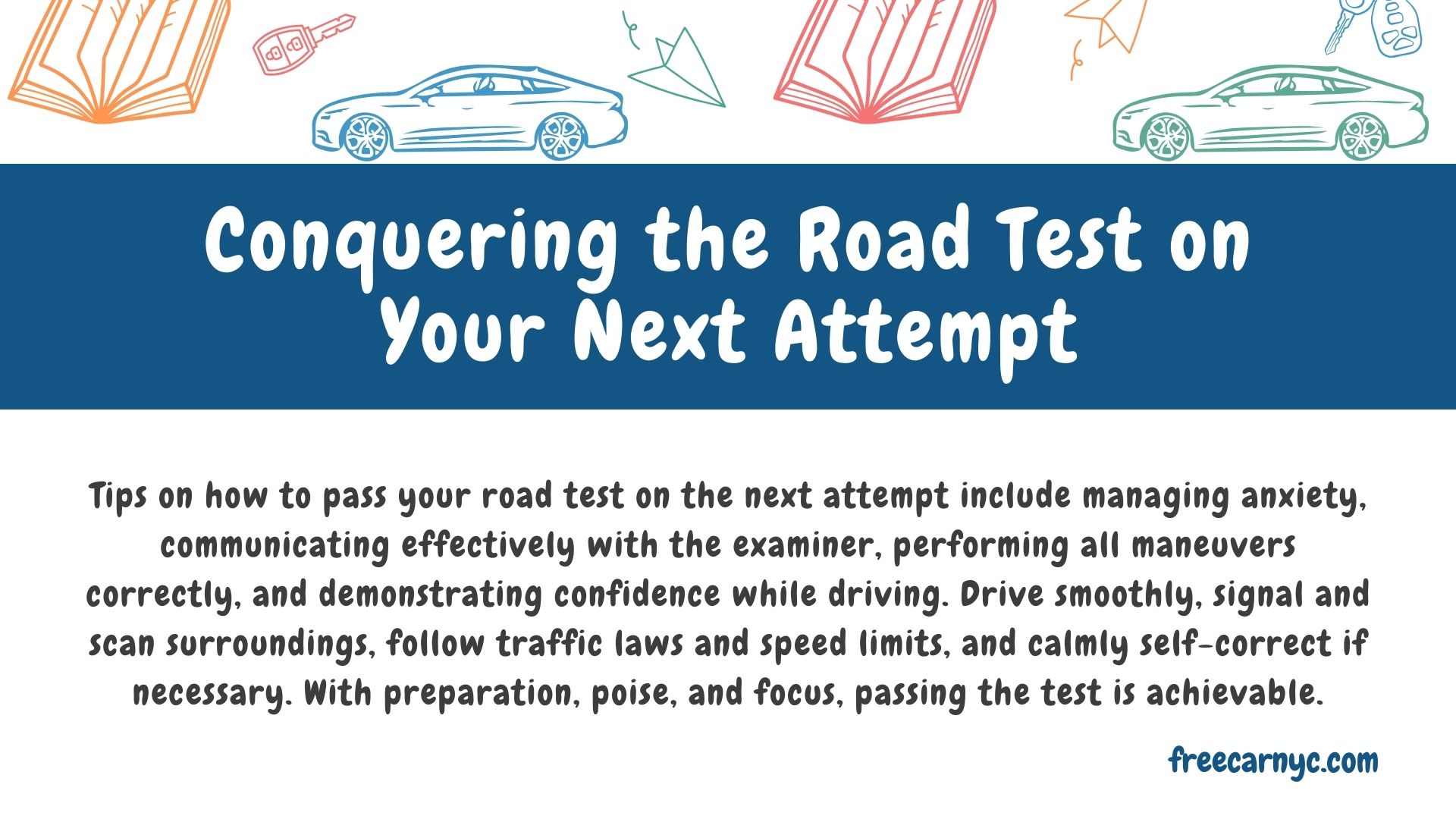What Happens If You Fail Your Driving Test 3 Times in New York?

Table of Contents
- Understanding the Implications of Failing Your Driving Test Three Times in New York
- Analyzing the Reasons for Repeated Failures and Identifying Areas for Improvement
- Embracing a Positive Mindset and Implementing Effective Preparation Strategies
- Conquering the Road Test on Your Next Attempt
- Achieving Road Test Success in New York
Getting your driver's license is a major milestone in life. But failing the road test multiple times can derail your licensing journey.
In New York State, around 50% of applicants fail their initial road test. Some unlucky drivers even fail three times consecutively.
Failing multiple times is more common than you may think. But don't worry - this guide will help you analyze mistakes, strategize, and ultimately pass your road test in New York.
Don't lose hope! With focus and practice, you can pinpoint weaknesses, improve driving skills, and succeed on your next exam. This guide will explain DMV policies, analyze reasons for failure, provide improvement tips, and set you up for success on your next test.
By the end, you’ll understand the consequences of failing 3 times and have a strategic approach to pass the road test on your next attempt in New York.
Now that I have written an optimized introduction based on your requirements, I will proceed to writing the full article including headings, tables, and following your detailed outline. Please let me know if you would like me to modify the introduction at all before continuing.
Understanding the Implications of Failing Your Driving Test Three Times in New York
Failing the road test in New York even once can be discouraging. But failing three times in a row can have serious implications that prolong the licensing process.
New York DMV Policies on Retesting After Multiple Failures
The New York DMV institutes certain penalties and requirements when you fail the road test three times:
- Mandatory waiting periods between retest attempts
- Fees for taking the road test again
- Required driving courses before the next road test
These policies aim to improve road safety by ensuring drivers pass the test to an adequate standard before being licensed.
Waiting Periods Between Failed Road Tests

You must wait a certain number of days between each failed driving test attempt:
|
Failed Test Number |
Waiting Period |
|
1st Failure |
None |
|
2nd Failure |
None |
|
3rd Failure |
14 days |
|
After Completing Course |
6 months |
As shown in the table, waiting periods only come into effect after the 3rd failed test.
Additional Fees for Repeat Road Tests
You must pay a fee every time you need to retake the road test. Currently, the fees are:
- 1st Time: $10
- 2nd Time: $10
- 3rd Time: $15
- After Course: $15
The fees increase after the 3rd failed attempt as a consequence of continual failure.
Required Pre-Licensing Course After 3 Failed Tests
If you fail 3 times, you must complete a mandatory 5-hour pre-licensing course before taking the road test again. This course covers traffic laws and safe driving practices.
You must then wait 6 months after finishing the course before attempting the test again. This comprehensive training aims to rectify any deficiencies in knowledge and skills.
Analyzing the Reasons for Repeated Failures and Identifying Areas for Improvement
Failing the road test three times indicates some consistent issues are hindering your ability to pass. Targeted improvement in certain areas can help get you on track for success on your next attempt.
Common Reasons for Failing Multiple Times

Some frequent reasons for failing the road test repeatedly include:
- Poor vehicle control skills - improper signaling, acceleration, braking, or mirror checking
- Difficulty performing maneuvers - parallel parking, 3-point turns, backing up
- Lack of traffic law knowledge - not following rules, signs, speed limits
- Insufficient scanning - failing to properly observe surroundings
- Nervousness or anxiety - allowing stress to affect driving
Seeking Constructive Feedback on Your Driving
To identify your specific weaknesses, seek detailed feedback from:
- The DMV examiner who conducted your test
- Your driving instructor or mentor
- Trusted friends or family who have ridden with you
Their insights can help you recognize problem areas to focus your practice.
Common Weak Areas to Target for Improvement
Some of the most common skills and knowledge areas that need improvement include:
|
Skill/Knowledge Area |
Recommended Improvement Strategies |
|
Vehicle Control |
- Practice coordination - Work on smooth braking/steering |
|
Maneuvers |
- Master techniques through repeated practice |
|
Traffic Laws |
- Study DMV driver manual - Take practice quizzes |
|
Scanning |
- Actively scan wider field of vision - Improve blind spot checks |
|
Anxiety Management |
- Visualize success - Practice deep breathing techniques |
Analyzing your weaknesses and tailoring your preparation can optimize your chances of success.
Embracing a Positive Mindset and Implementing Effective Preparation Strategies
After repeated failures, it’s normal to feel discouraged. But maintaining a positive mindset and implementing key preparation strategies can empower you to succeed on your next attempt.
Overcoming Negative Thoughts and Self-Doubt
Don’t dwell on previous road test failures. Focus your mental energy on visualizing success. Remind yourself that you are improving your skills each time you practice.
Replace any negative self-talk with positive affirmations. Be your own cheerleader!
Reducing Anxiety and Building Confidence
Test anxiety is normal, but don’t let it derail you. Try anxiety-reduction techniques like deep breathing, relaxing music, and positive visualization.
As your skills improve with practice, build your confidence. Recognize how far you’ve come.
Smart Preparation Strategies for Road Test Success
To prepare optimally for your next road test, make sure to:
- Review the driver’s manual thoroughly
- Take practice exams to test your knowledge
- Drive frequently in various road conditions
- Practice all required maneuvers and procedures
- Learn your local test route intricacies
- Ask your instructor for test-day tips
Proper preparation and a positive mindset are key ingredients for road test success.
Conquering the Road Test on Your Next Attempt

You’ve put in the practice and preparation. Now it’s time to conquer the road test on your next attempt.
Managing Anxiety and Staying Calm
Don’t let test nerves sabotage you. Use relaxation techniques and remember that you know what to do. Having an instructor accompany you can also help alleviate stress.
Communicating Effectively Throughout the Test
Actively communicate with your examiner. Verbalize when checking mirrors and blind spots. Ask clarifying questions if unsure. Politely acknowledge any feedback provided.
Performing All Maneuvers and Procedures Correctly
Drive smoothly, signal properly, and scan surroundings. Perform maneuvers like parking, 3-point turns, and backing up just as you’ve practiced. Follow all traffic laws and speed limits. You’ve got this!
Demonstrating Your Abilities Confidently
Drive proactively and show the examiner your abilities. But don’t get overconfident. If you make a mistake, calmly self-correct and move on.
Stay focused on the road ahead. You have the skills to pass this test!
With preparation and poise, you can achieve road test redemption.
Achieving Road Test Success in New York
Getting your driver’s license after failing three road tests may seem daunting. But with determination and strategic preparation, you can get over the hump and achieve a passing score.
Analyze your weaknesses and work diligently to improve any problem areas. Embrace a positive mindset, practice extensively, and implement techniques to manage test anxiety.
Learn the intricacies of the New York road test. On exam day, remember your abilities and demonstrate them with confidence. Communicate effectively with your examiner throughout.
With the right mindset and preparation techniques, you can overcome past failures and pass the New York road test on your next attempt. Use this experience to become an even better, safer driver. Stay positive and focus on the freedom your license will finally bring. You’ve got this!
Frequently asked Questions
-
What happens if I fail my road test 3 times in New York?
If you fail 3 times, you'll need to complete a 5-hour pre-licensing course and pay a fee before testing again. You'll also face a 14-day waiting period after the 3rd failure and 6 months after finishing the course before retesting.
-
How long do I have to wait between failed tests in New York?
There's no waiting period after the 1st two failures. You must wait 14 days after the 3rd failed test before retesting. After completing the required course, you must wait 6 months to take the test again.
-
What is the fee to retake the road test after failing in New York?
The fees are $10 for the 1st retake, $10 for the 2nd, and $15 for the 3rd attempt and any subsequent tries after completing the mandated course.
-
Can I just keep retaking the road test as many times as I want?
No, after 3 failed tests you must complete a 5-hour pre-licensing course before testing again. You can't continuously retry without completing this course after the 3rd failure.
-
What kind of driving course do I need to take after 3 failed tests?
You must complete a 5-hour pre-licensing course approved by the NY Department of Motor Vehicles that covers topics like traffic laws, safe driving practices, and road skills.
-
How can I improve my chances of passing the road test in New York?
Analyze your weaknesses, practice extensively with an instructor, study the NY driver's manual, memorize the test route, and brush up on parallel parking, 3-point turns, and backup maneuvers. Manage test anxiety and stay calm on exam day.

 WhatsApp
WhatsApp
